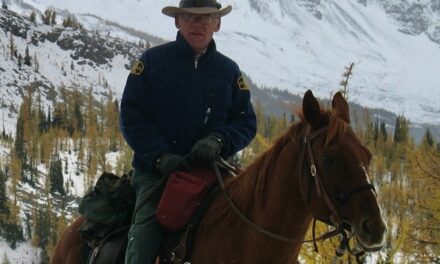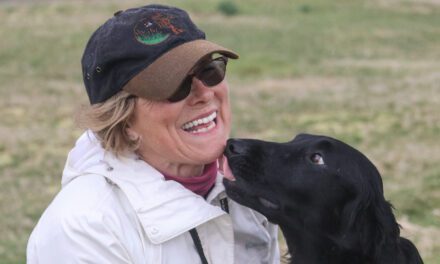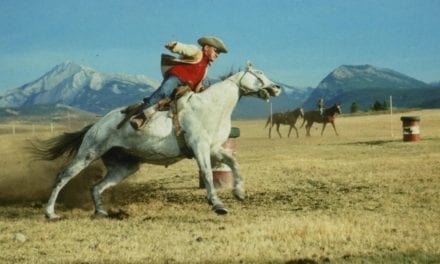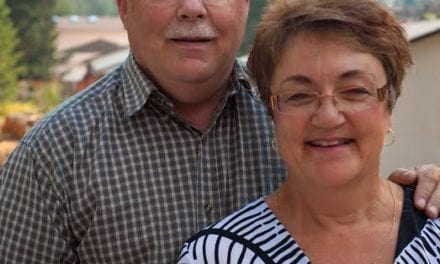(1:22:16) So I said, “Okay Tim, what do you do (as a warden)?” And he laid it out. A lot of it was based on mountaineering, but he mentioned that there was a lot of backcountry and patrols. I thought, “Okay, what the hell, I am looking for a summer job.” I was still fairly involved with my academic research at the time. I didn’t seriously think of it as a job that I really wanted. But I thought it is going to be very interesting and I don’t have a job. I applied and got an interview. I got asked some of the dumbest questions that I have ever been asked! “What would you do if you had to go to the bathroom and you were with a bunch of guys?” I said, “What would you do if you were on a glacier and you had nowhere to go?”
“Who interviewed you?
Jim Simes, and I forget who else, oh, and Max Winkler.
(1:23:12) Now this was the critical thing. Max Winkler was one of the people on the board. The more I said, “Yeah, I can climb this. I’ve shot guns all my life. I can ride. I can ski. And I have a degree in biology.” And you didn’t even need a degree, but they were really quite impressed with having a degree. I was well qualified for the first position coming open. However, part of the affirmative action was that they had this thing called the Women’s Conservation Corp. They had the Boys Conservation Corps, that they had run that for quite a while. It is the idea of taking all these 17 year-old kids and putting them in a camp and teaching them a lot of the mountains skills. They would also have some work projects. Max, I could just see him getting more and more excited because he was the person in Waterton who was selected to have the women’s first Conservation Corp and he was terrified! He thought, “Who am I going to get to run this thing?” So they offered me the warden job, but then they said, “We don’t want you to take it (yet).” Max had convinced them that he wanted me to go down and run this conservation corp. I thought, “Well okay. It sounds interesting.” It was probably one of the best jobs that I had in my life. It was incredibly rewarding! I got down there and I had Nancy Gordon and Betty Beswick, they were the foremen and I was the supervisor…The girls ranged in age from 16, 17 and I think some of them were almost 18. We had a little camp outside of town on the lake. I got down there and these girls, just looked terrified! They were sitting there going, “What do we do? We wrote a letter saying that we wanted to do this.” But they had no concept of what they were actually getting involved with. I was taking them out hiking and on one of the first hikes…one of the girls, it turned out that she was terrified of heights. They had to shuffle across these open scree slopes. That began the process of teaching. Give them a chainsaw, give them an ax. After a while they kept saying they would like to come into town and go to a dance. Max was (worried) “They might get pregnant.” I said, “Max, they might kill themselves. I am more worried about them living.” Seeing these girls out there with these axes and chainsaws! So they had a lot of wonderful projects. We had an incredible Esprit du Corp. There was one occasion when we were told that we could not go off and do one project because the weather wasn’t good enough. This was half way through and they were really coming along. They were learning and they looked like lumberjacks. They were really pulling together. I said, “It is not your fault that you got turned down. I know you can do it and I am going to bat to try and get you to do this work. I believe in you.” They called me Mother Superior because I wouldn’t let them go to town, but we had incredible adventures! At the end of the program they put together a skit, well a whole evening. They invited all the officials in town to come out. They put on a big dinner and then they had a number of songs and skits and everything like that depicting their summer. It left you in tears. I stayed in touch with a lot of them for a long, long time. They gave me a big award and stuff. At the end they all ran over and gave Max a big hug! He was just going “What do I do with them?” I couldn’t believe how fulfilling it was. So that meant that I didn’t join the warden service in 1974, but I still had the numbered position.
(1:27:52) I went for an interview the next year with Hal Shepherd who was the chief park warden in Yoho. They decided that I would go to Yoho which in the long run was a very good choice. It was very good for me. Lots of climbing, lots of mixed work. We got to work with everything…The first thing that Hal used to do when he got new people coming on was show them a picture of Wilf Etherington who was mauled by a grizzly bear. (In 1973, Canadian Wildlife Service biologist Wilf Etherington was assigned to work with wardens in Lake Louise. He was studying the effects of an immobilizing drug on bears when he was killed by a grizzly during a relocation exercise.)
I think he wanted to see what your reaction was. Are you going to be able to deal with things like this happening? So I started that next summer in Yoho (1975).
“Gord Rutherford and Don Mickle spoke about your first day. The men were so nervous. They didn’t know, should they stand up or sit down?”
(1:28:49) Oh, yes this is quite a story! Well, I was actually married at the time. But we were sort of separated my husband had been going up north. We were not really living together anymore…We were trying to work something out, but it was obvious that it was kind of over. Anyway he left me this car, a little Fiat and nothing worked on this car. I had the thing loaded right to the ceiling with all my stuff to go to Yoho. I thought, ‘I am going to be really smart. I am going to go one day ahead of time to make sure that I get there on time.” But like I said, nothing worked on this car. It was raining cats and dogs. I pulled into the park gate. I could see there was nobody around except this RCMP car on the other side of the gate. I went through the gate and I said, “They are going to pull me over.” Sure enough, they did. It was one of these things, I couldn’t find my drivers license. I could see them standing there in the rain going “Why did we do this?” I had to turn off the car to look for everything. Well, the only way that you could get things started again was to turn the key on, run out and open the hood and try to get these wires together. You couldn’t do it by yourself; you needed help! These guys had gone back to their car and they were sitting there watching me run around trying to get this thing going. It is amazing that they didn’t pull me over because of the car. But finally they came back and they said, “Are you having trouble?” I said, “Yeah! If you put the wires together, I will turn the ignition.” I finally got it running and then I said, “Now can you start the windshield wipers?” I think that they were so glad to see me leave! Anyway I got to Banff, and I was staying with Nancy Gordon that night. The next day I went out to get my car going and it did quit. It had quit. So I took it into the garage. I am going, “So much for the best laid plans of mice and men.” I had to phone them and say, “I’ve got to get my car fixed. I can’t get there” These guys were in this meeting and normally you have a half an hour meeting about what you are going to do that day. So they sat around and they sat around and finally I got there about 10:30 in the morning I think it was. I was supposed to be there at 8:00. They had been sitting in this meeting for two and a half hours waiting for me to show up. The secretary was Gordon Rutherford’s sister, Pat and she is quite quiet. I came in and she just quietly went over and walked down to the meeting room and she said, “Here’s Kathy.” I looked in the room and these guys just leapt up. There were chairs flying everywhere! They all went around and had to pick up their chairs. They just looked scared as hell!
“Were you scared as well?”
(1:31:55) No, I was happy. I was happy because I had spent most of my life working with men. I was used to men. I was used to being in an environment where I was the only woman. That was even true at university at that time. I had a couple of girlfriends and then everybody else were men, who were my friends. They were all sitting there. Their shirts were pressed and their ties were on. I mean, they don’t wear ties. I am going “Holy cow!”
(1:32:39) After that I got introduced and I had a little trailer (to live in). They got me settled and then I thought I would go to work. But nobody (thought that I could do anything) and I don’t know why this is true because before a lot of wardens wives had been in the backcountry working with their husbands. I don’t know why they were thinking women couldn’t do anything…They had very little idea of what I could do, so they kind of assumed that I couldn’t do anything. I was kind of put in a little room, kept at a distance and this went on for a couple of weeks. I was actually working on a hydro project with Dave Reynolds. I was sort of assigned to that because of my background. He kept doing all the work and we were putting in stakes to measure water levels, doing water velocity rates and things like this. So it was an interesting study. But for the first two weeks, he wouldn’t let me do anything. I just drove around. I just sat with people. Finally we went down to the Ottertail and we got out. All these guys were out there with their hip waders on building all these stations. I said, “I really should be doing something here. I would like to do some work.” Randy Robertson looked at me and he kind of got this funny look on his face and he said, “Oh yeah? Okay, well, you see that rusty barrel on the other side of the Ottertail River?” Why don’t you go get it for us?” So I put on the hip waders. I went over, got the barrel, rolled it in the water. I had the water float it over and I gave him their barrel. I said, “Here is your barrel. I don’t know what you want to do with it.” After that they let me do anything I wanted. Then I was part of the crew. You had to show that you could do things. My climbing at that point in time was very important because I would have to take them out climbing, like they didn’t have any of the skills. So that was good. Then when it came down to the horses, I could ride. I would go out and do things. And I knew how to run a chainsaw so I was out clearing trail. I was brought right into the fold. If you could do it they let you do it. I never really had any trouble after that.

Kathy Calvert and Don Mickle – 1970s
Photo courtesy of Don Mickle
(1:35:25) “Because of your background and personality, Don Mickle said you would be the perfect woman to start with the warden service, the perfect pioneer.”
They had also hired another woman. Like we were both hired at the same time. But she went to work at Pacific Rim. Her name was Jan Cadieux. In a sense, although we were both first hired, she was the one who actually worked the first year, because I had to go to Waterton. We had all been at the seasonal school together. I think she only lasted a couple of months.
“Was Betty Beswick hired after you?”
She was hired not the next year, but the year after that. Actually, I think it was a couple of years later. She went to Jasper. She didn’t stay there very long either. I was used to working with men and I think that the big thing is that I was used to the rougher elements of what men were like. It didn’t bother me. You had to have the right personality to start back then, or even now I think, anytime. You just have to know how to fit in.
“I also heard that you said, you fit in, but don’t lose who you are and don’t lose your femininity.”)
Yeah, that was very important. Other women came along and they tried to be too much like the men, so you had to keep your identity and people respected me for that. That was very important. I didn’t try to be a man. People who did didn’t last. I think Betty worked for about a year and then she quit too. Then there was a long period of time when there was just me. I think that the next person who came along who really was good at it was Diane Volkers. A number of women came along, but they would last a couple of months and then they never came back. When Diane came along she was the right person for the job. She obviously did very well.
How long were you in Yoho?
(1:39:10) About nine years I guess. Again it was wonderful because you got to do everything. Learn to work with bears, lots of backcountry. Well, whatever backcountry you didn’t trip over the highway! Climbing, a lot of climbing. Then I got involved with avalanche (control).
(1:39:33) I went to Rogers Pass the second winter. That was another new thing, the work in Rogers Pass. I was working for the warden service. We were doing roadblocks and a lot of skiing. I could ski and that made a big difference because a lot of other people went over there and didn’t know how to ski. I had already been doing some pretty serious skiing in Rogers Pass before that, the Abbott Gullies and things like that. So I think that catches us up to the first year that I met Dale.
“That was in 1975 that you met in Yoho?
(1:40:10) Yeah. (At this point, Dale rejoined the interview to discuss what it was like being married to another warden and what it was like working with Kathy.
(1:40:21) Dale – Well, actually we met the year before that at the Palisades. I was with Bob Sanford and we were trying to get a party going and we went over to the Ice House because we knew that there was some really shiny looking girls that were staying there. I walked up and knocked on the door and tried to invite them to a party that night. But they all looked at us and said “No!”
(1:40:39) Kathy – That was me, I said “No girls. We don’t go to parties.” That was the start of my Mother Superior role. It didn’t last long!
Were you up there with those young girls from the Women’s Conservation Corp.?
It was Betty, Nancy and I. We were just in training to go down there (to Waterton). I don’t remember meeting you actually. Just this vague shadowy figure at the door. “Come on girls, let’s go to a party!”



